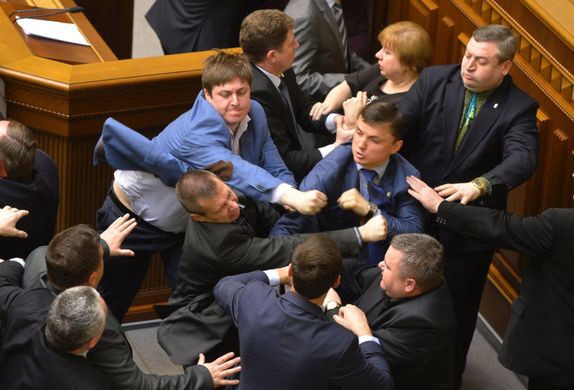 Mike RomigBlockedUnblockFollowFollowingDec 5
Mike RomigBlockedUnblockFollowFollowingDec 5
Paris is burning after days of violent riots by frustrated citizens who feel their concerns are not been taken into account. Britain is being rocked by uncertainty and concerns of a “constitutional crisis” over Brexit after a single referendum was used by millions of citizens to channel all their frustrations and fears with the direction their country has been taking. The USA flitters from one self-made crisis to the next, with an ever more polarised and conflictual discourse taking grip of politicians and media on all sides: politics seems less about running the country, and more about winning or losing. Germany totters on the edge of its seat as their Chancellor, Angela Merkel, makes her exit after 13 years in power, with everyone asking: how can such a leader be replaced?
All the while, global issues such as climate change, migration and rapidly increasing income inequality remain woefully unaddressed. Populations throughout the world’s democracies feel disempowered, dissilusioned by politics and unheard, especially those on the “margins” (rural, working or lower middle class, etc), and increasingly vote to the extremes (mainly to the right, but also left –Bernie Sanders in the US, Podemos in Spain, the Greens in Germany).
What is clear is that, in most people’s opinion, our democracies are currently not working as they would like. They are frustrated, dissilusioned, angry…
And somehow, the only answers we seem to come up with are “politicians need to get back in touch with their people” as The Guardian proposed in response to the wave of protests in France. Or, for example Michael Sandel, of Harvard University, says that if the Left in democratic countries hope to “win back public support” they need to “rethink liberal politics”. Even Otto Scharmer, author of Theory U and professor at MIT, in his recent analysis of the current political trends, looks at how there is an “axial shift” away from left and right politics to “open and closed” politics — and for left-wing politicians to succeed they need to “put forth a more daring new narrative”.
My question is: what do we need to go further than changing our politicians and actually change our political systems?
For over a year, a few friends and I have been reflecting on this question, connecting with others who are interested in the transformation of democary and we’ve begun recording many of our reflections in the blog posts on the “Upgrading Democracy” page. We have increasingly being using the brilliant Theory U model developed by MIT’s Presencing Institute, and have followed the 2017 and 2018 Massive Online Open Course (MOOC) by MIT “Ulab : Leading from the emerging future.”
This has helped us to deepen our understanding of our own connection to the topic of democracy and to see more clearly the key transformations we believe are needed in the current democratic systems: the “U” model brings them together perfectly.
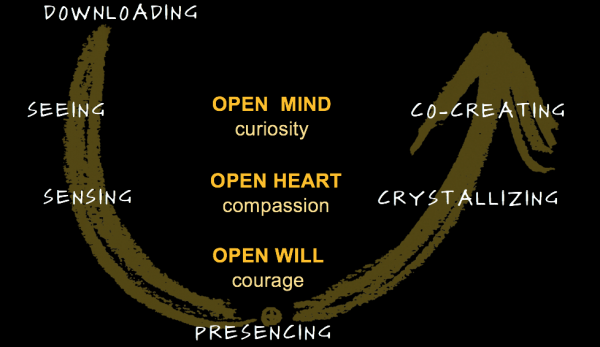
The first transformation is that we, in our politics and societies, must have “open minds”. Concretely, this means shifting from a politics as conflict to a politics as transformative dialogue aimed ensuring that we can all have a healthy and sustainable life together and on this planet. It means being curious about what others think, and open to different opinions.
When listening to reporting about the US mid-term elections, the language was so much about “winning”, “beating” and “taking back” that it might as well have been an NFL game. The same is true of most democratic countries today, we speak of parties “winning elections” or of a particular policy being a “victory” for this or that politician… meaning that their opponents will ensure to revoke it at the first occasion.
So little focus is actually on finding sustainable, long term solutions, including all perspectives and co-creating something that works for all sides. In Switzerland, the famously slow pace of change and highly diffused distribution of power means that nearly all change or policies are a co-created solution including all relevant stakeholders. Indeed, Alain Berset, the current President, recently joked that “it’s good to be boring in these uncertain times”. However, event in boring Switzerland, many of the referenda are increasingly seen as a “victory” by one party or the other.
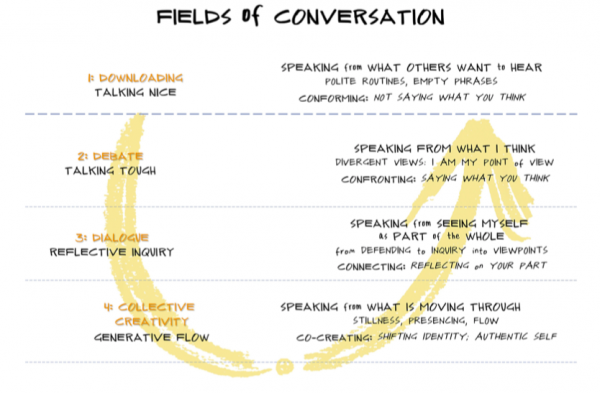
What would politics look like if there were true listening between people who hold different political opinions? What solutions would emerge if we engaged in generative dialogue with those we disagree with?
The Presencing Institute puts it very clearly: we can have conversations at very different levels. Either talking nice and not really engaging (Downloading), or talking touch and arguing for our point of view (Debate — which is what most politics is today), or from reflective inquiry and a real interest in understanding how your viewpoint fits into the whole alongside mine (Dialogue), or, in some rare occasions, from a generative flow and a place where each of you leave the conversation feeling like a different person, like you’ve changed (Collective Creativity).
How would politics look, if we (and our politicians) were having conversations from levels 3 and 4? If the governance of our countries was ensured through reflective inquiry or generative discussions, rather than through debate and conflict?
The second transformation of our current democratic systems which is needed, is that we have an “open heart”. This means that we embue our politics and our interactions with empathy and compassion, with openess to the perspectives of others, especially when they disagree with us. That this disagreement can teach us something about ourselves, and help us grow. That we see each person, regardless of their background or beliefs, as worthy of our respect and their fears, concerns and views as legitimate.
Today, too much of our politics is about dehumanising the other, about creating “Us and Them”. And it is not only the far right who can be blamed for this. Shows such as the Daily Show with Trevor Noah and others (which I personally love watching), create just as much polarisation, dehumanisation and damage as many right wing commentators.
Jessica Berlin, founder of CoStruct, in her TEDx talk gives a perfect example of this lack of an open heart: “It is dehumanisation when we see people in our communities who have genuine fears and struggles, economically and socially, and we say “You should think like us! Why are you so closed minded and racist? Get with the times!” Instead of listening and having a human conversation as equals about their fears and where they may be coming from.”
The third transformation our democratic systems needs is that we have an “open will”. Concretely this means that we enable people, all people, to take responsibility for the governing of their districts, cities, regions and countries… and this doesn’t mean electing people to represent them every four years, but being as involved as they can be in as many decisions and ideas and initiatives to govern their lives.
It requires deeply reviewing our methods of political decision making. From our discussions and reflections, the following seem most important:
- Getting rid of representative democracy where politicians are elected based on their personal characteristics and instead having random citizens chosen through sortition (like for jury duty). Examples of this include Iceland’s “crowdsourced constitution”.
- Having full transparency of information and decisions to be made in the political sphere and using technology to enable as many individuals to participate in direct decision making. Examples of this include #MaVoix in France, Civocracy or Liquid Democracy
- Make a certain amount of civic and political participation obligatory (as it is to file taxes)
Of course, such fundamental shifts in our democratic system requires shifts in nearly all other areas of our lives: the economy or management (e.g. for work life to give people the time to take part in politics), in society (e.g. for equal parenting to enable men and women to participate as fully), in education (e.g. for people to learn to fully take responsibility, to be co-creators from the start), or in business (e.g. to be living the shared leadership, non-hierarchical within companies as in politics). In many ways, this is the type of simultaneous systemic change which the Presencing Institute’s 4.0 Lab is aiming to achieve.
So the question remains: What do we need to achieve this? HOW can we affect such a change of systems and mindsets? How can we concretely move from where we are now, to where we need to be?
Well, the answer at this stage is, we don’t know. We’ve tried talking about it, thinking about it, meditating about it, but we believe the solutions need to come from a very different place. A collective place. A collective place of really not knowing. And that from there truely new, collective, and relevant systems of democratic governance can emerge.
The approach we want to try at the moment is to use the structures that the Presencing Institute has set up — namely the Societal Transformation Lab (S Lab) — to prototype these changes.
Firstly, we aim to prototype holding generative dialogues about updgrading democracy with as many people already within the U Lab or S Lab community and others who we can reach today. We hope to generate, through a quick iterative process that can be easily replicated in a large number, understanding of what people fear with the current democratic system, what are their hope, what triggers a change from ‘there is no alternative’ to ‘let’s build something together’, some key principles and potential features.
Secondly, we hope to expand the reach of this process, using the participants from the first phase as multipliers, to groups of people from as many different backgrounds, political perspectives, and worldviews as possible.
We are, however, very open to suggestions, ideas, questions, or comments — so get in touch!




















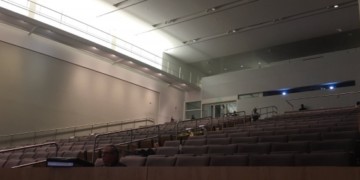

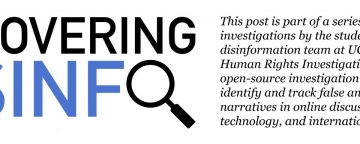

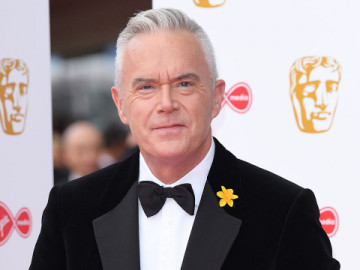

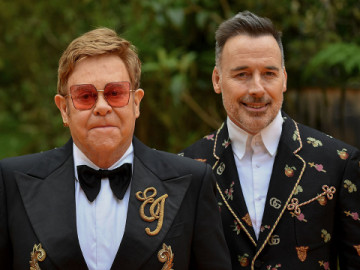

Connect with us